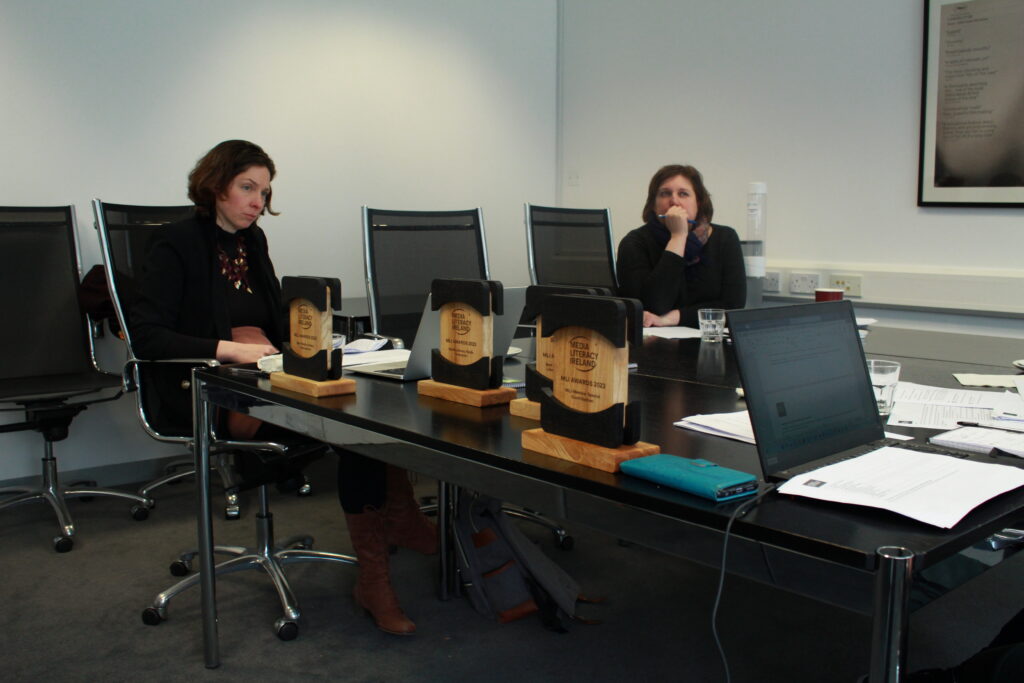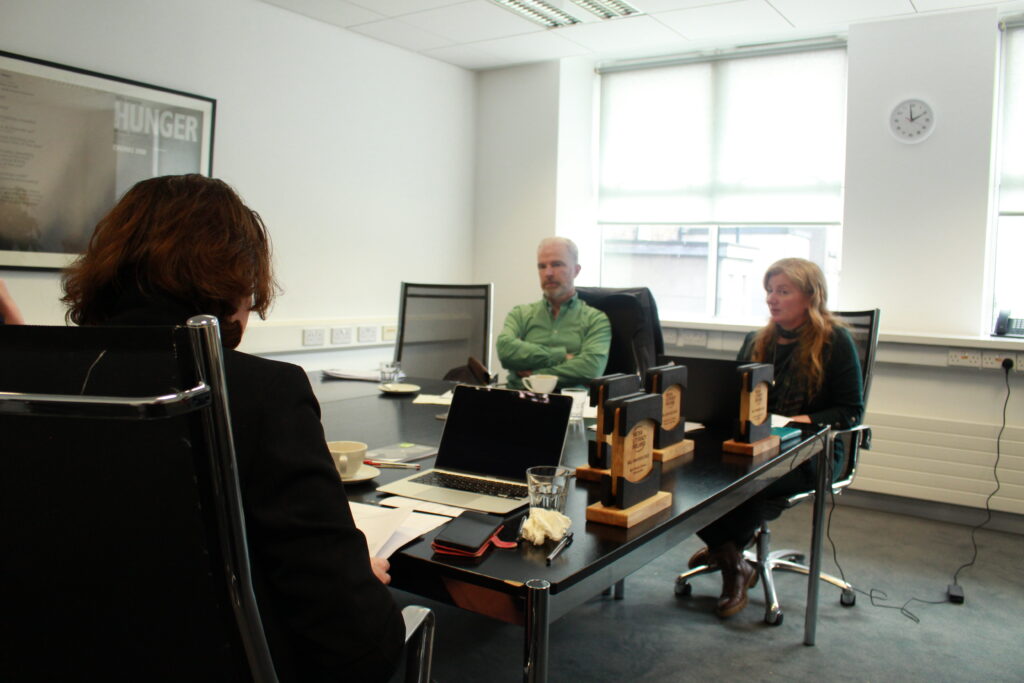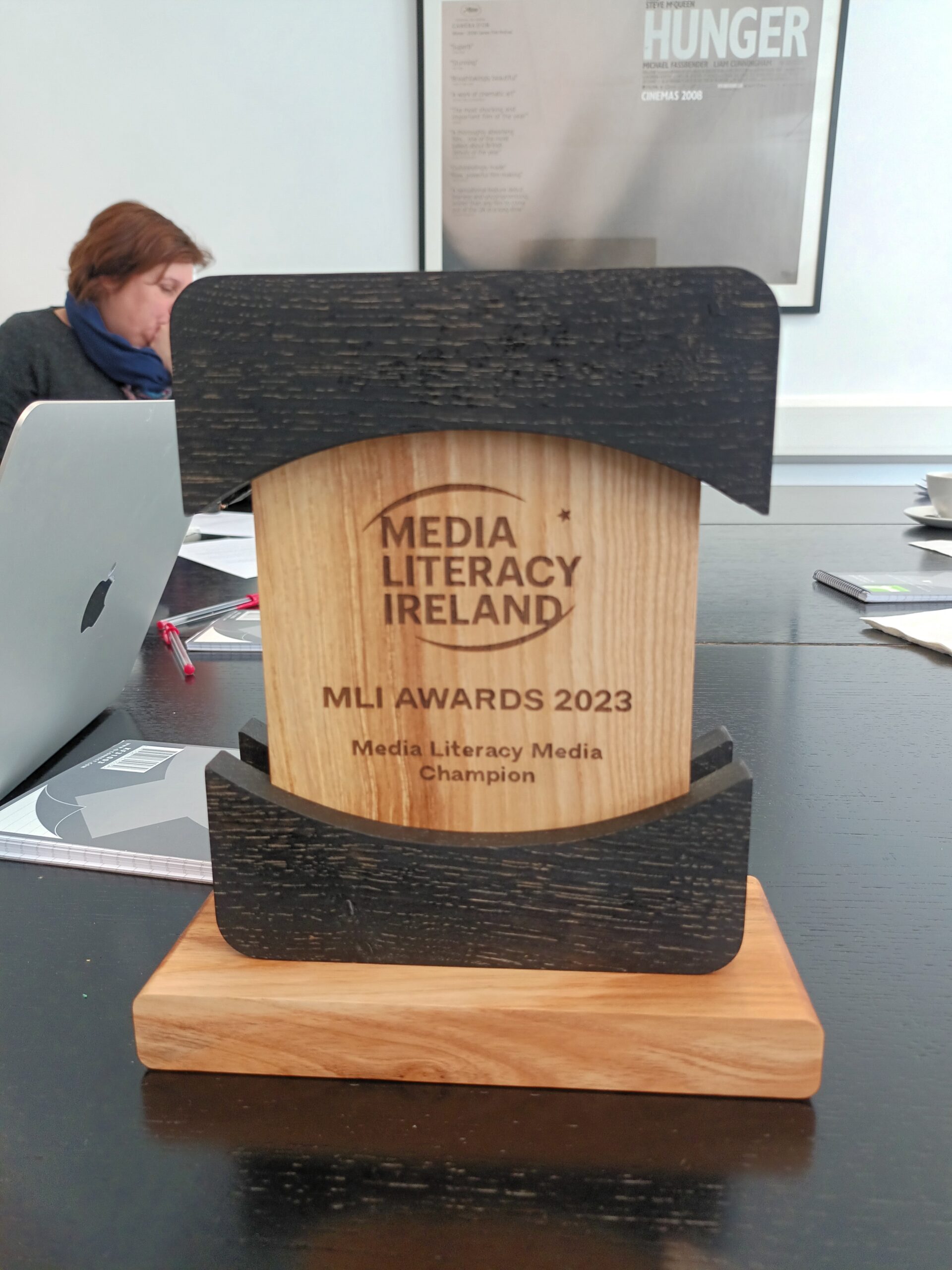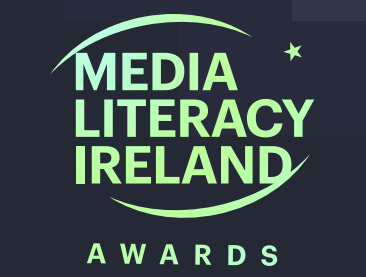The judges have deliberated. The scores are recorded. The entries have been short listed.
On the 30th March 2023, the first ever MLI Awards Judging Panel convened to discuss and assess over 30 entries for the 2023 MLI Awards Programme.
The judging panel consisted of Stephanie Comey, Co-Chair of MLI, Eileen Culloty, Vice-Chair of MLI and Ross Keane, MLI Steering Group member.
Martina Chapman, MLI National Coordinator was an observer to the proceedings.


Short-list for the Best Youth-Led Media Literacy Intervention

This category includes any project, initiative or activity created by, or delivered by, school-aged children and young people (5 – 18) that promoted at least one skill outlined in the Coimisiún na Meán (formally BAI) Media Literacy Policy.
For this category the judges noted that “The imagination, skill and enthusiasm demonstrated by the entries in Best Youth-led Media Literacy Intervention category, as well as the diversity of topics addressed and approaches employed, left us feeling reassured that the future of media literacy was in safe hands”.
And the short-listed entries are:
- Internet safety with an emphasis on Fake Advertising/Fake News (Super Shampoo): This short video was created as a result of collaboration between children of Miss Donegan’s Class in St. Joseph’s National School in Ballyheigue. The ‘Super Shampoo’ project aims to raise awareness of Fake Advertising and how some products just are too good to be true! The judges said “We were delighted with the creative and collaborative approach demonstrated by this project involving the whole school body, and in the effective communication of the skills required to critically assess media advertising”.
- TY Media Week: The ‘TY Media Week project is an initiative of the Independent Radio Sector in Ireland and its training organisation, Learning Waves which involves training transition year students in media literacy and giving them the opportunity to research, produce and present two hours of radio on their local/ regional radio station. The judges noted “We were impressed by the use of an immersive learning environment to equip young people with the skills to tell their own stories. With innovative and creative methodologies, it demonstrates a hands-on approach to developing media literacy skills while creating content“.
- Safer Internet Day Ambassador Programme: The Webwise Safer Internet Day Ambassador Programme is a peer-led training programme for post-primary students involving online (webinars) and offline training to the youth ambassadors to empower them to lead safer internet campaigns in their schools. The SID Ambassador programme gives post-primary students the tools to lead their own awareness-raising campaigns in schools, clubs, and communities across Ireland. The judges observed that “this project was particularly innovative and effective in its use of an ‘ambassador’ model and peer-to-peer support to empower young people to develop media literacy skills in a relevant and impactful manner”.
- Scamoflage: This 2 minute video was designed to dive a little deeper into the world of digital misinformation and to uncover the best ways to spot real information from fake information. Aimed at schools, families, friends, classmates and communities, the message was published as a photo campaign in Irish newspapers on Safer Internet Day 2023 with the support of Trend Micro, Ireland. The judges commented “Media Literacy messages can be complex to deliver. This video expertly communicated the nuances of managing false information wrapped in a very energetic, engaging, and knowledgeable presentation“.
Short-list for Best Media Literacy Intervention

This category includes any project, initiative or activity that promoted at least one skill outlined in the Coimisiún na Meán (formally BAI) Media Literacy Policy.
For this category the judges were “impressed by the depth and breadth of the entries, demonstrating huge variety, innovation and creativity. This was a highly competitive category with projects showing real commitment to and knowledge of media literacy issues”.
And the short-listed entries are:
- Alva’s World: Created by award-winning Irish animation studio Kavaleer Productions, Alva’s World is a fun, irreverent animated show for pre-school children which aims to create a new canon of fables for the digital age, placing media literacy, internet safety and empathy at the heart of its inventive and whimsical storytelling. The judges “were extremely impressed by the creativity and exceptional communication of complex media literacy messages in this animated series. It is also notable for delivering media literacy to very young audiences (and to their parents/carers) in such an engaging and subtle way”.
- Integration Radio Training Programme: This initiative was designed to integrate members of new communities in Ireland with the Irish media scene. Developed by community station RosFM, this QQI level 3 radio training course was created for members of the Afghan, Syrian and Ukrainian communities. On this project the judges were “impressed with the model used to provide access and media skills to new and minority communities in Ireland, underling the essential contribution that community media makes to the promotion of media literacy in Ireland”.
- Press Pass Student Journalism and News Literacy Programme: Press Pass is a Transition Year student Journalism and news literacy programme which has been run by NewsBrands Ireland since 2012. The free programme, which has been completed by over 120,000 students to date, seeks to teach the fundamentals of journalism writing, improve news literacy and critical thinking skills, and encourage students to analyse content and form opinions about important social issues. The judges noted that this project “is a great example of how young people can be engaged in the world of news production. The programme is sustainable and hands-on for the target audience and offers young people from across the country opportunities to produce news.”
- What is Digital Citizenship and How to Teach it – Online courses for Teachers: This online course, designed by PDST Technology in Education and Webwise is an online summer course for post primary school teachers on the topic of Digital Citizenship. The course is based on the 10 themes of Digital Citizenship which fall into the 3 categories of ‘Being Online’, ‘Wellbeing Online’ and ‘Rights Online’. The judges noted how this project “demonstrated how teachers can be empowered to deliver important digital citizenship messages effectively. The programme provides essential pedagogical approaches to support teachers as they navigate complex but essential topics“.
Short-list for MLI Member Special Contribution

This category recognises the specific contribution of an MLI member (individual or organisation) has made to the promotion of media literacy. All the nominations were made by third parties.
The judges wanted to thank all the MLI members who have been contributing to the work of MLI and wanted to acknowledge that “MLI members are the heart and soul of MLI. Without individual members sharing their time, expertise and ideas, we could not achieve as much as we do. We acknowledge and thank everyone who has contributed to MLI and we are pleased to see members of MLI recognise the work of other members with such generosity and acknowledgement”.
And the short-listed nominees are:
- Áine Ní Chaoindealbháin (Virgin Media): Nominators for Áine said “VMTV deserves special mention because they are actively engaged in creating opportunities to promote Media Literacy dialogue on/off screen. The team ensures to invite and encourage MLI experts to share views and insights to inform and educate their viewers. VMTV support the sector through their active membership in MLI and engage with other media peers to ensure better outcomes can be achieved and sustained through collaboration.”
- Jane McGarrigle: Nominators for Jane said “From the recently launched Silent Witness campaign to the impactful Connected series which focuses in on misinformation to the resources to help teachers in explaining what misinformation is to their students. Jane is always collaborating with other organisations to produce impactful content and to reach communities where it is needed most. Of course, coordinating the annual Safer Internet Day for Ireland is also not for the faint hearted. Again, a truly genuine person making such a huge difference. And she does all of this with a welcoming and friendly smile no matter what her day/week/month has been like“.
- Joe Phelps, Getting Better Foundation: Nominators for Joe said that “Decades ago, Joe recognized the polarization our world is facing due to the advent of the internet was creating mistrust and mental health disorders. He founded and funded our Getting Better Foundation and its world-class advisory board to research and address solutions. In partnership with Wadi Rum Films, he co-produced the “Trust Me” Documentary which brings awareness of peoples’ need for media literacy to build trust, resilience, and preservation of democracy”.
- Máire Aoibhinn Ní Ógáin (TG4): Nominators for Máire Aoibhinn said that she “has been active in MLI since the very beginning. She has quietly and consistently contributed to almost every aspect of MLI’s work. She was a central part of the original Be Media Smart campaign, securing the launch in Croke Park, as well as overseeing all of the translation for the Irish ads. More recently her chairing of the Irish language working group prompted the development of the first Irish Glossary of media literacy terms – which she was also very heavily involved in. Apart from the big projects that she has led, like the translation of the new MLI website, she is consistently on hand to support and advise on whatever aspect of media literacy that MLI works on“.
- Seán Tadhg Ó Gairbhí (Tuairisc.ie): Nominators for Seán said “The Tuairisc.ie initiative called ‘Láithreach Bonn’ aimed to discuss media literary related issues arising from major crises of our time. Namely,
1) Climate Change and the Environment: the existential threat from climate change
2) Environmental, cultural and linguistic diversity: the erosion of our cultural ecology
3) Challenges facing democracy in Europe – the threat of extremism and misinformation.
The multi-faceted series focused not only on the challenges but also on solutions and in doing so highlighted and promoted media literacy in a tangible and informative way to their readers. It included three live online seminars hosted by Cathal Mac Coille which ran between February 2022 and May 2022“. - Webwise: Nominators for Webwise said “Tracing its history back over some 20 years, Webwise has an exceptional track record in promoting balanced, trustworthy and enabling guidance and support regarding children and young people in the digital environment. Webwise has been in the forefront of promotion of media literacy in Ireland and has set the standard for good-quality media literacy resources in the country, combining well-planned pedagogical approaches with creativity, communication skills and innovation”.
Short-list for MLI Media Literacy Media Champion

This category recognises the work of a person or organisation that has raised the profile of media literacy in Irish media. Nominations were a mix of third-party nominations and self-nominations.
The judges were keen to note that “the work of media organisations and individuals working in media to promote media literacy is a critical element of helping every citizen develop the media literacy skills required for effective functioning in everyday society. The entries for Media Literacy Media Champion show the impact and reach that individuals and organisations can have and we look forward to expanding this category in the future to reflect the broad nature of contributions from the media”.
And the short-listed nominees are:
- Joseph Hoban (RTÉ): The judges noted that “Joe Hoban’s contribution to the promotion of media literacy in Ireland via his central role in the national Be Media Smart campaign and the ‘Stop, Think, Check’ call to action, has become a centre-piece of the work of MLI. In particular, Joe’s contribution has helped to create something that empowered many other MLI members to play their part more effectively, helping MLI reach more people with a positive message than anyone thought possible.
- The Journal FactCheck team: The judges recognised how this entry “outlines pioneering work in improving public understanding of news media by engaging people with the process of making news and the importance of good information hygiene. It is notable that The Journal FactCheck team employs innovative content and outreach to address some of the most complex media literacy issues today“.
- The Tonight Show, Virgin Media One: The judges acknowledged that “this entry demonstrates how media literacy topics can be integrated into current affairs content and improve the understanding of media literacy issues of the day”.

One winner from each category will receive a specially commissioned MLI Award.
The Awards were designed and produced by Cian Magill, of Magill Woodcraft Ireland. The design is an abstract representation of an enlightened eye – symbolising the power within, that can be achieved with persistence and inner belief. It is also inspired by the concept of awareness, critical thinking, and one’s motivation to make a positive difference in the world.
The simple, yet elegant, design incorporates some mid-century modern style elements and comprises of a base and engraved inner layer made from native Irish Ash. The top and bottom sections are crafted from ebonised native Irish Oak.
Winners will be announced on 19th April.
